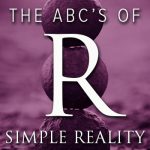
Humanity needs to engage in a profound dialogue as to the nature of reality. To do so within the old context (P-B) with the old language and with intuition being subordinate to intellect would be a waste of time. What is needed is not an extensive new language but just the addition of a few critically important terms describing a few foundational concepts.
At the same time, we can turn within, relying upon our intuition supported by the intellect, and thereby begin the process of shifting to the present moment (P-A). To that end we offer those important terms and a description of their meaning in relation to each other and in relation to paradigms A and B. Remember, “related pairs” are not the same thing as “pairs of opposites.”
It has not yet been proven nor disproven that intellectual knowledge—as opposed to experiential knowledge—is helpful to attaining awareness or, in other words, to attaining the shift to P-A. This leads us to the conclusion that it is best to assume we can prepare ourselves for the shift by understanding the distinction between paradigms B and A as profoundly as possible. One effective way to do so is to study the differences between the related pairs below as aspects of reality and illusion—or we could also say, as aspects of the Absolute and the relative.
The only exception among the pairs is the trio of related concepts, namely, transcendence, transformation and translation.
The three primary related pairs, without which Simple Reality cannot be understood, can be easily recalled with this memory device pronounced like the word “fear.” “Feiirr” helps recall: feeling and emotion; intuition and intellect; and response and reaction. Memorize these terms and learn the distinction between each pair and that understanding will facilitate your paradigm shift.
The distinction between the following related pairs and related concepts helps define Simple Reality or what Buddha called “right view” and thereby aids in the shift from P-B to P-A. Each is an article in this encyclopedia.
| Related Pairs |
|
Absolute and Relative |
|
Abundance and Limitation |
|
Anima and Animus |
|
Cause and Effect |
|
Clarity and Confusion |
|
Conditioning and Behavior Modification |
|
Cooperation and Competition |
|
Detachment and Dis-identification |
|
Engagement and Pacifism |
|
Esoteric and Exoteric |
|
Experience and Meaning |
|
Feeling and Emotion |
|
Field and Form |
|
Good and Bad |
|
Heaven and Hell |
|
Inclusion and Exclusion |
|
Integration and Disintegration |
|
Introversion and Extroversion |
|
Intuition and Intellect |
|
Justice and Karma |
|
Masculine and Feminine |
|
Reality and Illusion |
|
Response and Reaction |
|
Saints and Sinners |
|
True Self and False Self |
| Related Concepts |
|
Process — Transcendence, Transformation and Translation |


